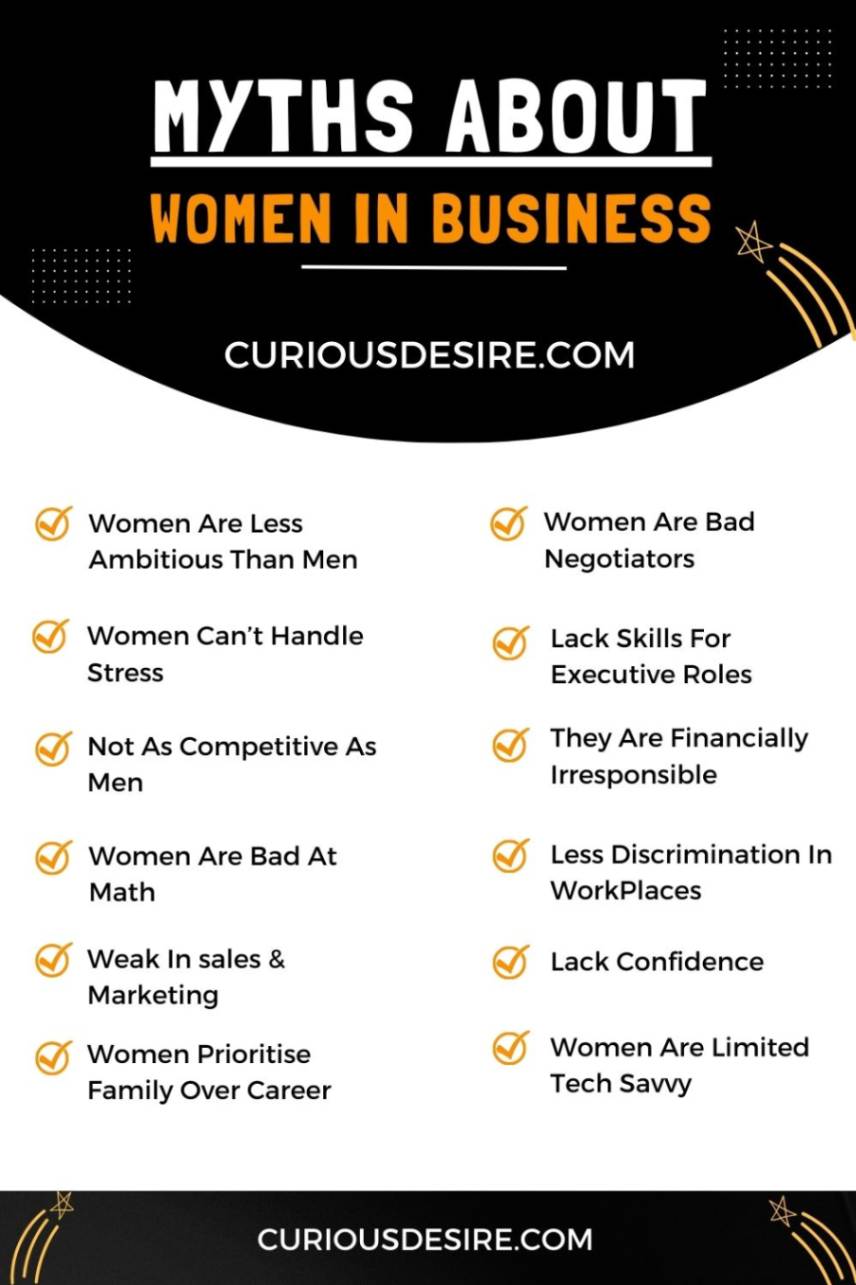Out of every 4 businesses in low-income countries, one is owned by a female entrepreneur. This number is significantly higher in middle and high-income countries, with rates of 36% and 37% respectively.
In the world of business, women are continually proving their strength, resilience, and matchless capabilities.
Let’s debunk the myths about women in business and break down the barriers.
5 Most Common Myths About Women In Business
- Women are not as ambitious as men in business.
- Women are not great leaders.
- Women are not good at negotiating.
- Women are not as dedicated to their careers as men
- Women are not as capable of handling high-stress situations

Myth 1: Women Are Less Ambitious Than Men
Why This Myth Exists:
The myth that women are less ambitious than men is deeply rooted in our societal perceptions and stereotypes. This undermines the capabilities and aspirations of women in various professional spheres.
Gender roles have played a significant role in shaping the perception of women’s ambition. From a young age, girls are often socialized to prioritize caregiving roles, while boys are encouraged to be ambitious in their pursuits.
In the past, women were often denied access to educational and career opportunities, limiting their ability to pursue ambitious goals.
Debunking The Myth:
Research consistently shows that women are, in fact, equally ambitious as men, and sometimes even more so. Women’s ambition may manifest differently due to varied societal expectations and personal priorities, but it is by no means less potent than men’s.
According to the World Economic Forum, in many countries, women now outnumber men in tertiary education. The increased pursuit of higher education by women is a testament to women’s ambition.
Women’s ambitions are not only present but thriving, shaping the future of industries, economies, and societies.
Myth 2: Women Are Not Good Negotiators
Why This Myth Exists:
It is simply a stereotype rather than an accurate reflection of women’s abilities. Historically, women have been raised to be accommodating, and taught to avoid conflict, while men have been encouraged to be assertive and competitive. The evidence, including research findings, quotes from industry leaders, and real-life examples, dispel this myth.
Another reason for this and the other myths about women in business is the lack of representation of women in leadership and negotiation roles.

Debunking The Myth:
A study published in the Harvard Business Review in 2018 found that women outperform men in negotiation scenarios. Women have traits such as empathy, and active listening that is advantageous in negotiation. These skills facilitate understanding, collaboration, and mutually beneficial agreements.
Christine Lagarde, Managing Director of the International Monetary Fund (IMF), has navigated complex international negotiations and earned praise for her diplomatic skills.
Dear Women, Never Forget How Wildly Capable You Are!
Myth 3: Women Can’t Handle High-Stress Situations
Why This Myth Exists: Women have often been stereotyped as emotional, sensitive, or fragile, while men have been characterized as stoic and resilient. These stereotypes have led to the perception that women are not equipped to handle high-stress situations.
Research has shown that there are no inherent gender differences in the ability to handle stress.
Debunking The Myth:
This is a harmful myth that is not supported by scientific research. Research contradicts this myth and highlights the resilience and adaptability of women in high-stress environments. A study published in the International Journal of Stress Management stated that women demonstrate effective coping strategies in response to stress.
Angela Merkel, the Chancellor of Germany, played a pivotal role in navigating the Eurozone crisis, showcasing not only her resilience but also her ability to make tough decisions under immense pressure.
During the COVID-19 pandemic, female political leaders like Jacinda Ardern of New Zealand exhibited great crisis management skills.
Myth 4: Women Lack Skills for Executive Roles
Why This Myth Exists:
Women have faced systemic barriers such as gender discrimination, unequal pay, and limited access to education and professional development. These barriers have hindered women’s career advancement and contributed to preserving the myth that women lack the skills for executive roles.
This myth overlooks the significant contributions of women in leadership positions.
Debunking The Myth:
To effectively debunk this myth, showcasing diverse women role models and leaders who have excelled in executive roles is important.
One notable example is Indra Nooyi, the former CEO of PepsiCo, who led the company with exceptional vision and determination for over a decade. Nooyi’s leadership made PepsiCo a global powerhouse.
According to a study conducted by McKinsey & Company, companies having women in their executive teams are 21% more likely to experience above-average profitability.
Myth 5: Women Are Not as Competitive as Men
Why This Myth Exists:
This myth of women being less competitive than men is a social construct based on historical and cultural gender norms.
Throughout history, women have been systematically discouraged from participating in competitive roles and have often been reduced to domestic roles. This societal conditioning has led to the prevalence of the myth that women are inherently less competitive than men
Debunking The Myth:
Women are just as competitive as men when placed in the same competitive environments. Their competitiveness in traditionally male-dominated fields, such as science, technology, engineering, and mathematics (STEM), debunks this myth.
Women athletes are consistently breaking records and achieving remarkable feats. Serena Williams, a 23-time Grand Slam tennis champion, is a living example of it.
A study published in the journal Nature in 2000 showed that when women had the same financial incentives as men, they exhibited the same levels of competitiveness.
Myth 6: Women Are Incapable of Handling Financial Responsibilities
Why This Myth Exists:
This myth is a product of historical and cultural gender biases. Throughout history, women have been excluded from economic decision-making, leading to the prevalence of this myth.
However, this myth is not supported by solid evidence and fails to account for the numerous women who have excelled and continue to do so in various financial roles.
Debunking The Myth:
Women are highly capable of handling financial responsibilities. Studies have shown that women often possess abilities that are beneficial in financial decision-making. They are often at the forefront of community and social impact investments
According to Sallie Krawcheck, CEO and Co-Founder of Ellevest, “Study after study shows that women arguably are better investors than men. And, they save more.”
Myth 7: Women Are Bad at Math
Why This Myth Exists:
This is one of the most widespread myths about women in business. It has led to widespread discrimination and barriers for women pursuing careers in STEM fields. This myth is contradicted by the increasing educational achievements of women in mathematics.
Women have always been discouraged from pursuing math-related careers and have been offered limited opportunities in this field, leading to fewer visible role models and reinforcing this myth.
Debunking The Myth:
This is something we’ve all heard at some point, right?
Globally, more women are pursuing degrees in STEM fields, including mathematics. Despite facing immense obstacles, women mathematicians have made groundbreaking discoveries and advancements in the field.
From Ada Lovelace, the world’s first computer programmer, to Emmy Noether, a pioneer in abstract algebra, women have made their mark in this field.
Fortunately, over the years, the gender gap in math achievement has significantly decreased. Data from standardized tests, such as the SAT, show that the difference in math scores between male and female students has narrowed.
Furthermore, it is important to recognize that the myth of women being bad at math is not only detrimental to women but also to society as a whole. By keeping up this myth, we are limiting women’s participation in the field of mathematics.
Myth 8: Women Are Not as Successful in Sales and Marketing Roles
Why This Myth Exists:
The myth that women are not as successful in sales and marketing roles is an outdated stereotype that lacks any empirical evidence to support it. It stems from the false belief that women are inherently less assertive, and competitive than men.
A comprehensive debunking of this myth is essential to recognize the valuable contributions that women make in sales and marketing.
Debunking The Myth:
Contrary to the myth, countless female sales and marketing professionals are excelling in their careers and achieving remarkable success.
Emotional intelligence is a critical factor in sales success, and women are often praised for their high emotional intelligence.
Women in marketing have been at the forefront of innovative and creative campaigns. The ability to think outside the box, develop compelling narratives, and create impactful campaigns is not restricted by gender.
Beth Comstock, former Vice Chair of General Electric, and Gail Goodman, former CEO of Constant Contact, are examples of women who have risen to the top echelons of sales and marketing leadership.
American Management Association revealed that women sales representatives often exceeded their male counterparts in areas such as closing deals, building customer relationships, and maintaining client satisfaction.

Myth 9: Women Prioritize Family Over Career
Why This Myth Exists:
The myth that women prioritize family over career, making them less committed to professional responsibilities, originates from societal stereotypes and biases.
It is important to recognize that women’s choices regarding career and family are different and vary widely. While some women may prioritize family at certain stages of their lives, many others are deeply committed to their careers.
They are equally good at balancing their professional and personal responsibilities.
This one of the most prevalent myths about women in business.
Debunking The Myth:
Debunking the myth requires you to understand how women balance work and family life. Many women actively pursue both meaningful careers and fulfilling family lives, debunking the myth that these women can’t do both the ability to balance multiple responsibilities shows how capable women are.
Unequal division of domestic labor and workplace biases contribute to the challenges women face in balancing their professional and family lives.
It is important to create environments that support women in pursuing their professional aspirations without sacrificing their familial responsibilities.
As we strive for a more equitable society, it is essential to recognize and celebrate the diverse choices and achievements of women.
Myth 10: Women Are Not Tech-Savvy as Men
Why This Myth Exists:
Historically, the tech industry has been male-dominated, and traditional gender roles often steered men toward careers in technology and related fields, while women were discouraged from pursuing such paths.
Research has shown that when girls and young women are exposed to negative stereotypes about their abilities in STEM fields, they show less interest in pursuing careers in those fields.
Debunking The Myth:
The growing number of female graduates in these fields debunks this myth and demonstrates women’s proficiency in technology-related disciplines.
Women have played crucial roles in developing groundbreaking technologies and software. Sheryl Sandberg, Chief Operating Officer of Facebook, and Safra Catz, CEO of Oracle, are women who have risen to top leadership positions in the tech industry.
Women contribute actively to open-source projects, collaborating on the development of software and technology solutions. Their involvement challenges the myth and reinforces the idea that women are valuable contributors to the tech community.
The 2020 labor force statistics from the U.S. Bureau of Labor Statistics revealed that women make up 26% of the computing workforce, indicating a significant presence in the tech industry.
Myth 11: Women Do Not Commit to Long Working Hours
Why This Myth Exists: Women have been burdened with caregiving responsibilities and domestic duties, which has led to the perception that they are less committed to their careers and less willing to work long hours.
The myth that women do not commit to long working hours is a myth that limits opportunities for women in the professional world.
Debunking The Myth:
It is important to comprehensively debunk this myth by examining the complex factors that contribute to women’s commitment to long working hours and highlighting the realities.
From healthcare to finance to technology, women hold positions that demand extended work hours. This goes to show that all these myths about women in business are baseless.
Global workforce trends indicate that women, like men, are committed to advancing their careers. Women’s participation in the workforce tells us that they don’t shy away from long working hours.
This myth overlooks the domestic responsibilities on women’s shoulders. Women in business are expected to bear the responsibility of caregiving for children, elderly parents, or other family members as well. This makes it difficult for them to commit to long working hours. This does not reflect a lack of commitment on the part of women, but rather the extra responsibilities that society expects women to perform.
Myth 12: Women Face Less Discrimination in Workplaces Now
Why This Myth Exists:
The visibility of women in powerful roles leads to the perception that gender discrimination is no longer a significant barrier. However, it does not necessarily mean that there is equal treatment for all women at every level of the organization.
The myth that women in business face less discrimination today is a lie that overlooks the persistent challenges and barriers that continue to hinder gender equality in professional settings.
Debunking The Myth:
To debunk this myth about women in business, it is essential to acknowledge the discrimination against women in the workplace.
- Gender Pay Gap: Despite advancements in some sectors, women, on average, are paid less than men for the same work.
- Underrepresentation in Leadership Roles: Women continue to be underrepresented in leadership roles across various industries.
- Limited Access to Opportunities: Discrimination is evident in the limited access women have to certain opportunities, projects, or professional networks.
We should work towards creating a more equitable and inclusive professional environment for all.
Conclusion
It is essential to dismantle the myths about women in business that have held them back from achieving their full potential in the business world. By creating opportunities for mentorship, networking, and professional development, we can empower women to break through barriers and succeed on their terms.
It’s time to rise above these myths about women in business and strive for a future where women in business are truly valued, empowered, and given equal opportunities to succeed.
Women In Business Myths FAQs
1. Are women less capable of succeeding in business compared to men?
No, business success is not determined by gender but by one’s skills, knowledge, and perseverance. Women possess all the skills and determination required to succeed in a business.
2. What are the unique financial constraints faced by women entrepreneurs?
Women in business often encounter difficulty accessing capital, receiving lower loan amounts, and facing higher interest rates.
3. Are women-led businesses less profitable than those led by men?
Research has shown that women-led businesses can be equally or more profitable than those led by men. Assertions of lower profitability are often based on biases rather than factual evidence.
4. Are women-owned businesses adopting technology?
Yes, many women-owned businesses use technology for sustainable practices, such as utilizing data analytics for eco-friendly operations.
5. Do women struggle to balance career and family, affecting their business success?
Balancing career and family responsibilities can be challenging for both men and women. However, women’s business success should not be discounted based on family obligations. Organizations should support work-life balance for all employees to promote equal opportunities for professional growth.
6. Do women lack negotiation skills in business?
Women possess great negotiation skills. While societal conditioning may impact confidence levels, effective negotiation is a skill that can be developed and refined. Women have demonstrated prowess in negotiation when provided with equal opportunities and support.
7. Do women lack the necessary skills to succeed in male-dominated industries?
Women possess a wide range of skills that are valuable in any industry, including male-dominated ones. Gender doesn’t dictate skill sets, and women have demonstrated success in traditionally male-dominated sectors through their expertise and determination.
8. Are women less capable of handling leadership roles in business?
No, this is a common misconception. Women are as capable as men in handling leadership roles in business. Research shows that gender doesn’t determine leadership ability, and diverse leadership teams often lead to better decision-making and innovation.